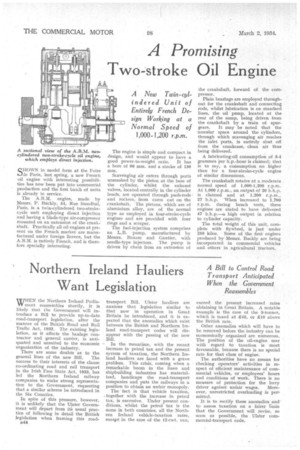Northern Ireland Hauliers Want Legislation
Page 58

If you've noticed an error in this article please click here to report it so we can fix it.
WHEN the Northern Ireland ParliaW ment reassembles shortly, it is likely that the Government will introduce a Bill to provide up-to-date road-transport legislation, after the manner of the British Road and Rail Traffic Act, 1933. The existing legislation, as it affects the haulage contractor and general carrier, is antiquated and unsuited to the economic organization of the industry.
There are some doubts as to the general lines of the •new Bill. The success to their interests of the clause co-ordinating road and rail transport in the Irish Free State Act, 1933, has led the Northern Ireland railway companies to make strong representation to the Government, requesting that a similar scheme be introduced in the Six Counties.
In spite of this pressure, however, it is unlikely that the Ulster Government will depart from it's usual practice of following in detail the British legislation when framing this road 1344 transport Bill. Ulster hauliers are anxious that legislation similar to that now in operation in Great Britain be introduced, and it is expected that the anomalies which exist between the British and Northern Ireland road-transport codes will disappear with the passing of the new Bill.
In the meantime, with the recent increase in petrol tax and the present system of taxation, the Northern Ireland hauliers are faced with a grave problem. This crisis, coming when a remarkable boom in the linen and shipbuilding industries has materialized, handicaps the road-transport companies and puts the railways in a position to obtain an unfair monopoly.
The fact is that vehicle taxation, . together with the increase in petrol tax, is excessive. Under present conditions, whilst the petrol tax is the same in both countries, all the Northern Ireland vehicle-taxation rates, except in the case of the 12-cwt. van, exceed the present increased rates obtaining in Great Britain. A notable example is the case of the 3-tonner, which is taxed at £45, or £10 above the British rate.
Other anomalies which will have to be removed before the industry can be economically organized are numerous. The position of the oil-engine user with regard to taxation is most favourable, because there is no special rate for that class of engine.
The authorities have no means for checking operators' activities in respect of efficient maintenance of commercial vehicles, or employees' hours and conditions of work. There is no measure of protection for the lorry driver against unfair wages. Moreover, unrestricted overloading is per:. mitted.
It is to rectify these anomalies and to assess taxation on a fairer basis that the Government will revise, so soon as possible, the Ulster commercial-transport code.




























































































